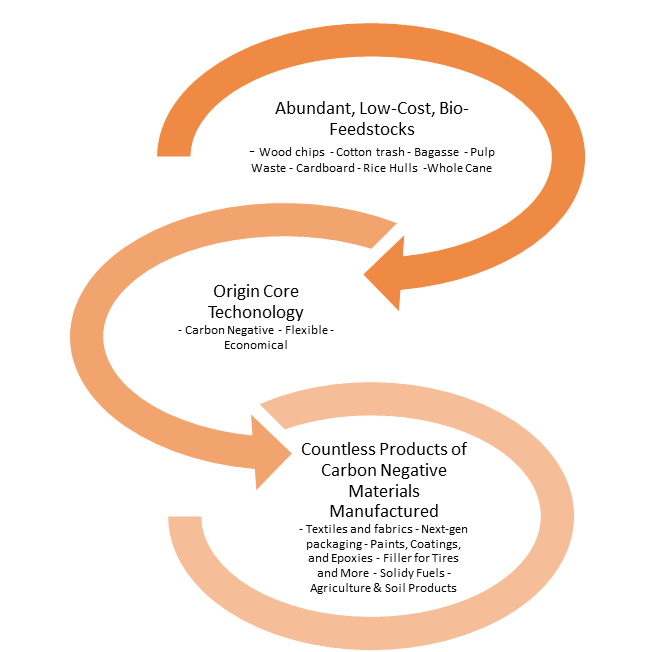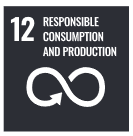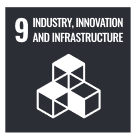Origin’s Mission is to enable the world’s transition to sustainable materials as the leading carbon negative materials company.
Our technology platform is a “once in a planet’ shift from fossil to decarbonized materials by replacing oil as the foundation feedstock for the materials economy. We turn carbon found in biomass into useful materials, thus eliminating the need for fossil resources and enabling the carbon capture in the process.

Currently, an estimated 55% of global carbon emissions come from energy generation and transport, while the other 45% come from the production of materials for consumer and industrial products, according to the Ellen MacArthur Foundation. That’s more than ten million barrels of oil per day being used to create materials. In the process, massive quantities of new carbon are being released into the atmosphere.1
We believe our platform technology can help make the world’s transition to “net zero” possible and support the fulfillment of greenhouse gas reduction pledges made by countries as part of the United Nations Paris Agreement as well as corporations that are committed to reducing emissions in their supply chains2. As part of our broad environmental, social and governance approach, our board and management have also aligned our strategy with the United Nations Sustainable Development Goals to demonstrate how we are supporting global efforts to improve our societies and the environment.
Environment
New strategies are needed to win the fight against climate change, and new, better materials will play a starring role – that’s how we’ll help make net zero possible.

Ensure sustainable consumption and production patterns:
- Origin’s strategy is to develop low and negative carbon materials for use in a variety of products, including textiles and fabrics, next generation packaging, paints, coatings, and epoxies, fillers for tires and other rubber products, fuels, and agricultural products.
- Materials are derived from abundant non-food sources, such as sustainably harvested wood, agricultural waste, wood waste and cardboard, with our expected feedstock demand in 2030 representing less than 1% of total world supply of forest residues and wood processing waste, with twice that amount available from alternate sources such as saw dust, corn waste, mixed paper, wheat straws and other sources
- Currently creating recyclable, 100% plant-based PET plastic through our partnership with Danone, Nestlé Waters, and PepsiCo
- Origin’s technology is validated through an ISO-compliant Life Cycle Assessment (LCA) conducted by Deloitte, which concluded that Origin’s products are expected to be carbon negative when produced at commercial scale
- Anticipate following a “co-location” strategy where our commercial scale plants are accessible on the on-site of the supply of wood chips and forest residue

Take Urgent action to combat climate change and its impact:
- Origin’s carbon negative materials replace petroleum-based materials with decarbonized materials
- Origin’s technology uses sustainable feedstocks that are not used in food productions thus eliminating the competing pressures on global food supplies
- Origin’s proprietary manufacturing captures the CO2 that may be released from dead and decaying woodlots in our products and uses them as raw materials3
Social
Access to versatile, carbon-negative, economical materials and technologies, and the expertise to apply them wisely is how we will execute.

Build resilient infrastructure, promote sustainable industrialization and foster innovation:
- Anticipating completion of our first manufacturing plant (Origin 1) in Ontario, Canada by 2022, and a significantly larger manufacturing plant (Origin 2) by 2025, which will spur regional economic activity and adhere to all applicable environmental regulations, permits, and best practices
- Exploring opportunities to work with upstream partners to identify suitable aging or defunct pulp millions to convert key equipment and integrate those components into refurbished and repurposed Origin chemical plants
- Developed a proprietary platform to convert biomass, or plant-based carbon, into versatile “building block” chemicals to produce a wide range of low carbon materials
- Hold a two-part patent portfolio on the biomass to chloromethylfurfural (CMF) and hydrothermal carbon technologies
Governance
Collaborative research and development will propel us forward the future of materials and contribute to the countless companies that have already dipped their toe in the water of sustainable development from sustainable product lines, buying carbon offsets, to installing solar panels.

Revitalize the global partnership for sustainable development:
- Launched NaturALL Bottle Alliance, a research consortium formed to accelerate the development of innovative packaging solutions made with 100% sustainable and renewable resources, with the Danone and Nestlé Waters in 2017
- Expanded the NaturAll Bottle Alliance in 2018 with the inclusion of PepsiCo to advance the shared goal of creating beverage containers with a significantly reduced carbon footprint
- Conducting joint research and development work with other parties, such as vendors and academic institutions4
- Exploring partnerships with existing forest product supply chains and government entities to repurpose public mills
- Entered into agreements with companies such as Mitsubishi Gas Chemical and Packaging Equity Holding to fulfill demand for carbon-negative and low-carbon materials
_______________________________
1 https://www.originmaterials.com/investors; under company overview - While an estimated 55% of global carbon emissions come from energy generation and transport, the other 45% come from the production of materials for consumer and industrial products. More than ten million barrels of oil per day are used to create materials, in the process releasing massive quantities of new carbon into the atmosphere. Origin’s vision for the future is to replace this oil use with non-food feedstocks and materials, while capturing carbon in the process.
2 S-4 page 173 under Overview - https://www.sec.gov/Archives/edgar/data/0001802457/000119312521073546/d147960ds4.htm
3 S-4 page 174 https://www.sec.gov/Archives/edgar/data/0001802457/000119312521073546/d147960ds4.htm
4 https://www.sec.gov/Archives/edgar/data/0001802457/000119312521073546/d147960ds4.htm --- Research and development – page 180 of S-4